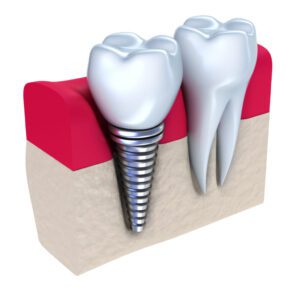Dental implants can offer patients with missing teeth a natural-looking and functioning replacement option to enable the best possible quality of life.

Louisville dentist Dr. Kim Westermann often recommends dental implants or implant-secured dentures because of the unique benefits they offer patients.
Dental Implants: What To Expect

The first step in getting dental implants is consulting Dr. Westermann. During this visit, she examines your mouth, takes X-rays, and checks if your jawbone is strong enough to support an implant. If your jawbone has weakened due to tooth loss, you may need a bone graft before placing the implant. She also discusses your medical history to ensure you are a good candidate for the procedure.
If your jawbone is strong enough, we proceed with the implant process. However, if you need a bone graft, the healing process can take several months before the implant can be placed. Some patients may also need a tooth extraction if the damaged tooth remains. Once your mouth is ready, we will coordinate the surgery with a local specialist.
The specialist performs the implant surgery under local anesthesia, so you won’t feel pain during the procedure. They make a small incision in the gum and drill a tiny hole in the jawbone to place the implant, which is a small titanium post that replaces the tooth root. After placing the implant, they close the gum with stitches, allowing the area to heal.
After the implant is placed, the healing process begins. The bone slowly grows around the implant in a process called osseointegration. This step is crucial because it strengthens the implant enough to support a new tooth. Healing usually takes three to six months, depending on the patient’s health and how well their body accepts the implant.
Once the implant is fully healed, the dentist attaches an abutment, a small connector that holds the artificial tooth in place. After the gums heal around the abutment, the dentist places a custom-made crown on top. The crown matches the color and shape of your natural teeth, creating a seamless appearance.
Dental Implant Benefits
Dental implants fuse with the jawbone, unlike dentures or bridges, making them stable and reliable. People who choose dental implants enjoy many benefits, including improved appearance, oral health, and easier eating.
A Natural-Looking Smile
One of the biggest benefits of dental implants is how natural they look. The crown, or artificial tooth, is custom-made to match the surrounding teeth’s color, shape, and size. This creates a seamless appearance that blends in with the rest of the smile. Because implants are placed securely in the jawbone, they stay in place without slipping or shifting, which can happen with dentures. This allows people to smile and speak with confidence.
Improved Speech and Comfort
Missing teeth or poorly fitting dentures can make it hard to speak clearly. Dentures sometimes slip, causing slurred or mumbled speech. Dental implants, on the other hand, function like real teeth. They allow people to talk naturally without worrying about their teeth moving or shifting. Since implants feel like natural teeth, they are more comfortable than other tooth replacement options.
Easier Eating
Chewing can be difficult when teeth are missing or dentures don’t fit well. Some foods like apples, nuts, or steak can be hard to eat with traditional dentures. Dental implants provide the strength to bite and chew all types of food without pain or difficulty. Since implants act like real teeth, people can enjoy their favorite foods without restrictions.
Long-Lasting and Durable
Dental implants are designed to last a lifetime. Made from strong titanium, they fuse with the jawbone in a process called osseointegration, making them as sturdy as natural tooth roots. Implants can last for decades with proper care, including brushing, flossing, and regular dental checkups. Unlike bridges or dentures, which may need to be replaced every few years, implants offer a more permanent solution.
Better Oral Health
Dental implants help protect overall oral health in several ways. When a tooth is lost, the jawbone in that area can shrink over time, weakening the bone structure and affecting the surrounding teeth. Implants stimulate the jawbone, keeping it strong and preventing bone loss. Additionally, implants do not require reducing or damaging nearby teeth, as is necessary for dental bridges. This helps keep the remaining teeth healthy and intact.
Increased Self-Confidence
Missing teeth can make people feel self-conscious about their smiles. Some may try to hide their teeth or avoid social situations. Dental implants restore a full, beautiful smile, boosting self-esteem. People with implants can laugh, talk, and eat confidently, knowing their teeth look and function naturally.
No Special Maintenance Required
Dental implants are easy to care for, unlike dentures, which require special cleaning solutions and adhesives. Like natural teeth, they only need regular brushing, flossing, and routine dental visits. This makes them a hassle-free option for those seeking a low-maintenance tooth replacement.
Frequently Asked Questions
We have answers to some of the most commonly asked questions concerning implant dentistry.
Will dental implants feel different from natural teeth?
No, implants feel almost identical to natural teeth once healed. Unlike dentures, implants are fixed in place, so there’s no shifting or discomfort while eating or speaking. However, the gum tissue around the implant may feel slightly different than around a natural tooth.
Can I eat normally with tooth implants?
Yes, after full healing, you can eat almost anything, including hard or crunchy foods. During the healing period, you’ll need to stick to soft foods to protect the implant. Unlike dentures, implants provide strong bite force, allowing you to enjoy your favorite foods comfortably.
Will I need to replace my tooth implant in the future?
With proper care, dental implants rarely need replacement. The titanium post can last a lifetime because it integrates with your jawbone. The crown attached to the implant might need replacement after 10-15 years due to normal wear and tear. Regular dental checkups and good oral hygiene greatly enhance the longevity of your entire implant.
Can tooth implants get cavities?
No, the implant itself cannot get cavities, but the surrounding gum and bone can still develop infections (peri-implantitis) if oral hygiene is poor. Regular brushing, flossing, and professional dental cleanings will help prevent complications.
Can I get tooth implants if I have bone loss?
Yes, but if you have significant bone loss, you might need a bone graft before implant placement. Some patients qualify for specialized implants like zygomatic or All-on-4 implants; they require less bone. A 3D scan helps determine if you have enough bone for implants or need grafting.
What’s the difference between single implants, implant bridges, and All-on-4 implants?
- Single implants replace one missing tooth with an individual implant and crown.
- Implant bridges replace multiple missing teeth using two or more implants as anchors.
- All-on-4 implants replace an entire arch of teeth using just four to six implants, supporting a full set of prosthetic teeth.
